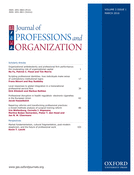Professional disruption in health regulation: electronic cigarettes in the European Union

In Journal of Professions and Organization, Volume 3, Issue 1
How do professions respond to fast-moving technological changes? Disruptive innovations overturn expectations about how markets function and develop, and they often raise moral, legal and scientific concerns among professionals. Sudden technological changes can result in a state of professional disruption, in which technological change challenges the institutional arrangements of a profession. This article distinguishes between fast and slow processes of professional change, focusing on the role of technology as one cause of fast changes to a profession. Professionals and non-professionals engage in framing contests that draw on cognitive, normative and relational keys to signal their expectations. It is in these framing contests that professionals run the risk of disruption. Drawing on interview data with key policy actors, I investigate electronic cigarettes regulation in the European Union and its recent revision to the Tobacco Products Directive. Medical and public health professionals that control tobacco issues were challenged by a coalition of e-cigarette industry representatives, e-cigarette users, and liberal politicians. The challengers drew on the contending norm of harm reduction in tobacco control, which successfully challenged the centrality of the abstinence norm in the institutional arrangements of the medical and public health professions and their organizational field. By discussing the parallels to other related cases in health regulation, I draw out the implications of the study for researchers and policymakers.
Link: here
![]()
This project receives funding from the European Union's Horizon 2020 research and innovation programme under the Marie Sklodowska-Curie Grant Agreement No 722826.
















